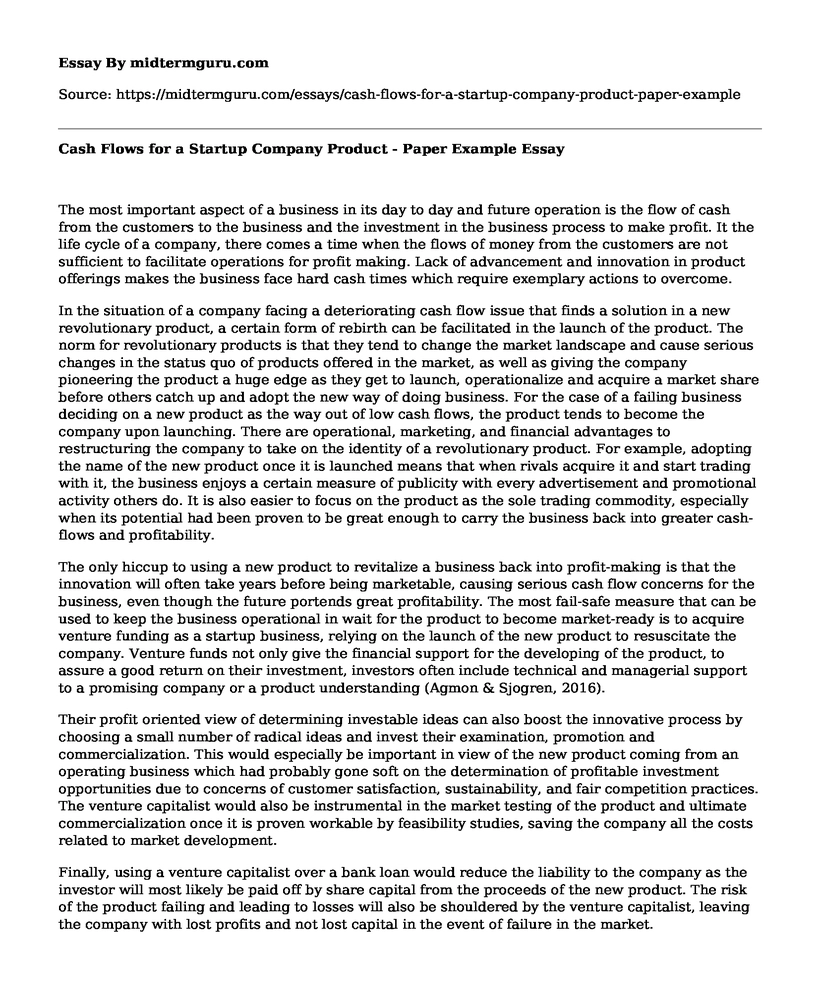The most important aspect of a business in its day to day and future operation is the flow of cash from the customers to the business and the investment in the business process to make profit. It the life cycle of a company, there comes a time when the flows of money from the customers are not sufficient to facilitate operations for profit making. Lack of advancement and innovation in product offerings makes the business face hard cash times which require exemplary actions to overcome.
In the situation of a company facing a deteriorating cash flow issue that finds a solution in a new revolutionary product, a certain form of rebirth can be facilitated in the launch of the product. The norm for revolutionary products is that they tend to change the market landscape and cause serious changes in the status quo of products offered in the market, as well as giving the company pioneering the product a huge edge as they get to launch, operationalize and acquire a market share before others catch up and adopt the new way of doing business. For the case of a failing business deciding on a new product as the way out of low cash flows, the product tends to become the company upon launching. There are operational, marketing, and financial advantages to restructuring the company to take on the identity of a revolutionary product. For example, adopting the name of the new product once it is launched means that when rivals acquire it and start trading with it, the business enjoys a certain measure of publicity with every advertisement and promotional activity others do. It is also easier to focus on the product as the sole trading commodity, especially when its potential had been proven to be great enough to carry the business back into greater cash-flows and profitability.
The only hiccup to using a new product to revitalize a business back into profit-making is that the innovation will often take years before being marketable, causing serious cash flow concerns for the business, even though the future portends great profitability. The most fail-safe measure that can be used to keep the business operational in wait for the product to become market-ready is to acquire venture funding as a startup business, relying on the launch of the new product to resuscitate the company. Venture funds not only give the financial support for the developing of the product, to assure a good return on their investment, investors often include technical and managerial support to a promising company or a product understanding (Agmon & Sjogren, 2016).
Their profit oriented view of determining investable ideas can also boost the innovative process by choosing a small number of radical ideas and invest their examination, promotion and commercialization. This would especially be important in view of the new product coming from an operating business which had probably gone soft on the determination of profitable investment opportunities due to concerns of customer satisfaction, sustainability, and fair competition practices. The venture capitalist would also be instrumental in the market testing of the product and ultimate commercialization once it is proven workable by feasibility studies, saving the company all the costs related to market development.
Finally, using a venture capitalist over a bank loan would reduce the liability to the company as the investor will most likely be paid off by share capital from the proceeds of the new product. The risk of the product failing and leading to losses will also be shouldered by the venture capitalist, leaving the company with lost profits and not lost capital in the event of failure in the market.
References
Agmon T. & Sjogren S. (2016). Venture Capital and the Inventive Process. Basingstoke: Palgrave Macmillan, DOI: 10.1057/978-1-137-53660-0
Bellavitis C., Filatotchev I., Kamuriwo D. S. & Vanacker T. (2017). Entrepreneurial finance: new frontiers of research and practice: Editorial for the special issue Embracing entrepreneurial funding innovations, Venture Capital, Vol. 19, Issue 1-2, pp. 1-16, DOI: 10.1080/13691066.2016.1259733
Cite this page
Cash Flows for a Startup Company Product - Paper Example. (2021, Jul 05). Retrieved from https://midtermguru.com/essays/cash-flows-for-a-startup-company-product-paper-example
If you are the original author of this essay and no longer wish to have it published on the midtermguru.com website, please click below to request its removal:
- Annotated Bibliography on Institutional Policy - Paper Example
- Analysis of DeFond and Zhang's View - Essay Sample
- Central Bank of Egypt and the United States - Compare and Contrast Essay
- Pay Taxes: Individuals' Responsibility to the State - Essay Sample
- Resilient Financial System: Australia's Changes Since 2017 - Research Paper
- Stock Market Crash: Catalyst of the Great Depression - Essay Sample
- Behavioral Finance: Psychology of Investors and Market Impact - Essay Sample







